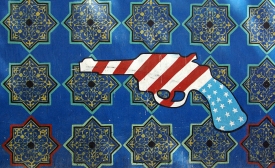rouhani
Pope Francis will receive in private audience Iranian President Hassan Rouhani tomorrow, the latest meeting in a flurry of Holy See diplomatic activity concerning the Middle East and China. […] The Pope and Holy See diplomats will probably try to use the occasion of Rouhani’s visit to help defuse tensions between the two Muslim-majority countries.

Reprinted from the CPD Blog by Sohaela Amiri (Oct 7, 2014)
Hardliners on both sides have ramped up their efforts to sabotage the deal, while both governments are trying very hard to defend the deal and present it as a historical victory, which it truly is. The publicity that the Iran Deal debates has gotten has allowed both the Iranian and American governments to portray their countries as pragmatic, pro-diplomacy, and pro-peace—thereby enhancing their soft power, as opposed to repellently boasting about their hard power.
Two years after his election, President Hassan Rouhani of Iran is about to go down in history as a leader who defused an intense and bitter conflict that could have led to a military attack on Iran. A nuclear deal that the majority of Iranians hope will bring an end to the isolation of Iran, much needed relief from international sanctions, and a new chapter in U.S.-Iran relations is now in sight. If other enemy countries have faced each other on the battlefield and ultimately managed to work out their differences, why is it impossible for Iran and the United States to do the latter?
Iran’s President, Hassan Rouhani, did not shake hands with Barack Obama at the United Nations this week, a year after their celebrated cell-phone chat. The two men didn’t even pass each other in the hallway. But Rouhani did give a quiet dinner at his hotel on Tuesday for twenty former American officials—including a secretary of state, three national-security advisers, and a chairman of the Joint Chiefs of Staff—from all six Administrations since the 1979 revolution.
Since the Iranian Revolution in 1979, the Iranian and American people have been isolated from one another due to long-standing disputes between their governments. Routine interactions, like sporting events between national clubs, and other cultural exchanges have been few and far between. However, recently thousands of fans across Southern California were able to witness a rarity: the U.S. and Iranian national volleyball teams squaring off in friendly exhibition matches as part of a goodwill exchange between the two estranged nations.
The Middle East is in turmoil and increasingly there is a need for the two regional powers, Iran and Saudi Arabia, to mend their differences in an effort to address urgent regional security matters. There is no denying that the Arab-Persian rivalry and sectarian divide is deep-rooted and will require serious dialogue and engagement to be rectified.







